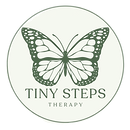- Elizabeth Ware

- Dec 22, 2024
- 4 min read
Puberty is a whirlwind of changes for both kids and parents. And when it comes to periods, it can feel like you're navigating a whole new world. If you're wondering how to best support your child through this transition, you're in the right place. The good news? You're not alone—occupational therapy (OT) can make this journey smoother, helping your child gain the confidence and independence they need.
Practical Tips for Supporting Your Child
You don’t have to go it alone! There are simple, effective steps you can take to help your child navigate puberty and manage their period with ease. Here are some practical tips that can make a huge difference:
Assemble a Period Kit
Creating a period kit is an easy and proactive way to make sure your child feels prepared when their period arrives. Here's what to include:
Period Products: Pads, tampons, or period underwear for practice.
Deodorants with Different Scents: Let your child pick their favorite scent, which can help them feel more comfortable and confident with their hygiene routine.
Period Underwear and Swimwear: These are discreet and low-maintenance options that provide added comfort, especially during activities like swimming.
Introduce Visual Supports
Sometimes, we all need a little help remembering things. Visual schedules and step-by-step guides can make a huge difference in helping your child:
Learn the sequence of using period products.
Track their period and recognise patterns.
Use visuals and reminders to assist with hygiene routines.

Practice Together
It might seem awkward at first, but practicing period care with your child can make it feel less intimidating. Unwrap, use, and dispose of products together to build confidence. Incorporating this practice into daily routines helps reduce anxiety and builds familiarity.
How Parents and Caregivers Can Help
Your role in this process is invaluable. Here's how you can further support your child’s confidence and comfort:
Normalise the Conversation
Talk openly about periods and puberty to reduce any stigma. When you create an open, non-judgmental environment, your child is more likely to feel confident discussing their experiences.
Model Calmness
It's natural for both parents and children to feel anxious, but staying calm and reassuring can help alleviate your child's fears and anxieties.
Collaborate on Solutions
Every child is different. Work together to identify strategies that suit your child’s unique needs and preferences.
Managing Common Challenges
It's normal to face some bumps along the way, but with the right approach, you can tackle common challenges:
Pain or Discomfort: Heat packs, relaxation techniques, and consulting with a healthcare provider can help ease menstrual discomfort.
Heavy Periods: Larger pads or absorbent period underwear offer extra security.
Dealing with Leaks: Leaks happen, and it’s completely normal. Reassure your child and prepare for these moments by having spare clothes and consider trialing period underwear to minimise the risk of leakage throughout the day.
Cultural and Social Considerations
When managing periods in a social or school environment, it’s important to consider these factors:
Work with Teachers and School Staff: Ensure your child has the time and space to manage their period at school. Create a period plan with them and identify places and people they can go to for support when managing their periods.
Respect Cultural and Religious Sensitivities: Be mindful of cultural or religious factors that may affect how periods are discussed or managed. Involve your child in these conversations to ensure they feel comfortable and respected.
Recommended Resources
Here are some resources that can help your child understand and manage their period:
The Autism-Friendly Guide to Periods by Robyn Steward: This book is perfect for children, especially those on the autism spectrum. It provides realistic visuals, simple language, and interactive worksheets to help children understand periods.
Social Stories for Puberty and Periods: Personalising a social story for your child can help them prepare for the changes associated with puberty and menstruation.
Period Tracking Apps and Tools: Help your child stay on top of their cycle with period-tracking apps or printable calendars.
Tips for Promoting Independence
Helping your child take charge of their period care is empowering. Here are some tips to encourage independence:
Practice Makes Perfect: The more your child practices, the more confident they’ll become.
Use Reminders: Set alarms or use visual prompts to help your child stay on track with period care.
Encourage Open Dialogue: Keep the lines of communication open so your child feels comfortable asking questions.
Transition Gradually: Help your child take responsibility for their period care at their own pace. Start with simple tasks like tracking their cycle.
How can Occupational Therapists help with puberty education?
Occupational therapists are experts in helping individuals develop the life skills they need to thrive—and that includes navigating puberty and periods. Here's how OTs provide tailored, practical support to make this transition easier:
Skill Development for Menstrual Products
Starting your period can be a daunting experience. OTs can teach your child how to use period products through hands-on practice and education, making it feel less intimidating.
Visual Tools for Routine Management
We all know how hard it can be to remember all the steps involved in managing your period. Visual schedules and checklists help your child track their routine—whether it’s changing products, maintaining hygiene, or just remembering when their period is due.
Resource Recommendations
Need a little extra help? OTs can point you toward books, guides, and other resources that break down the complexities of puberty and menstruation into something your child can understand and feel confident about.
Puberty and menstruation are major milestones for both children and their parents. While it can be challenging, the right tools, support, and guidance can make a huge difference. Occupational therapy provides a valuable framework for helping your child develop the skills they need to navigate this phase with confidence and independence.
Ready to get started? Contact us at Tiny Steps Therapy for personalised advice and support to help your child thrive during this transition.














